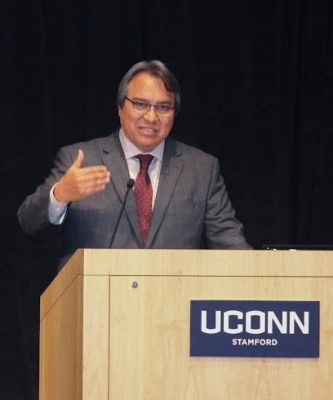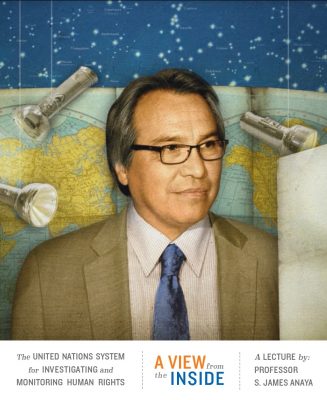MONDAY, APRIL 11, 2016
4:00 - 6:00 pm | STAMFORD CAMPUS GEN RE AUDITORIUM
4:00 pm RECEPTION
4:30 - 6:00 pm LECTURE
Speaker: S. James Anaya, Regents' Professor and James J. Lenoir Professor of Human Rights Law and Policy, University of Arizona, James E. Rogers College of Law
From 2008 to 2014 Professor James Anaya served as the UN Human Rights Council’s Special Rapporteur on the Rights of Indigenous Peoples. In that capacity he visited over thirty countries and reported on situations of indigenous peoples worldwide, in a multifaceted effort to advance compliance with human rights norms. Professor Anaya will reflect on his experiences as UN Special Rapporteur and comment on the utility and limitations of the UN’s broader system for monitoring and investigating human rights conditions.
If you are an individual who requires an accommodation to participate or questions, contact University Events and Conference Services at 860-486.1038 or RSVP@uconn.edu
Biographical Sketch:
S. James Anaya is a Regents Professor and the James J. Lenoir Professor of Human Rights Law and Policy at the University of Arizona James E. Rogers College of Law (USA), where he teaches and writes in the areas of international human rights and issues concerning indigenous peoples. Professor Anaya is a graduate of the University of New Mexico (B.A., 1980) and Harvard Law School (J.D., 1983). Among his numerous publications is his acclaimed book, Indigenous Peoples in International Law (Oxford Univ. Press, 1996, 2d. ed. 2004) and his widely-used co-authored textbook, International Human Rights: Problems of Law, Policy and Practice (Aspen, 6th ed. 2011) (with Hurst Hannum and Dinah Shelton). Professor Anaya served as the United Nations Human Rights Council’s Special Rapporteur on the Rights of Indigenous Peoples from 2008 to 2014. In that capacity, he examined and reported on conditions of indigenous peoples worldwide and responded to allegations of human rights violations against them, including through country visits and direct contacts with governments. For his work in that capacity, he was nominated for the Nobel Peace Prize. In addition to his academic work, Professor Anaya has litigated major indigenous rights and human rights cases in domestic and international tribunals, including the U.S. Supreme Court, Inter-American Court of Human Rights, and the Caribbean Court of Justice. Among his noteworthy activities, he participated in the drafting of the United Nations Declaration on the Rights of Indigenous Peoples and was the lead counsel for the indigenous parties in the case of Awas Tingni v. Nicaragua, in which the Inter-American Court of Human Rights for the first time upheld indigenous land rights as a matter of international law.
EVENT AFTERTHOUGHTS
By Catherine Buerger, Doctoral Candidate, Anthropology, University of Connecticut
 On Monday, April 11th, Professor S. James Anaya, Regents’ Professor and the James J. Lenoir Professor of Human Rights Law and Policy at the University of Arizona James E. Rogers College of Law, delivered a lecture on the Stamford Campus as part of the annual Senator Joseph I. Lieberman Conference and Lecture Series on Human Rights Practice. Professor Anaya served as the UN Human Right’s Council’s Special Rapporteur on the Rights of Indigenous Peoples from 2008 to 2014. His talk, which was titled, “A View from the Inside: The United Nation’s System for Investigating and Monitoring Human Rights,” discussed many of his experiences during this time.
On Monday, April 11th, Professor S. James Anaya, Regents’ Professor and the James J. Lenoir Professor of Human Rights Law and Policy at the University of Arizona James E. Rogers College of Law, delivered a lecture on the Stamford Campus as part of the annual Senator Joseph I. Lieberman Conference and Lecture Series on Human Rights Practice. Professor Anaya served as the UN Human Right’s Council’s Special Rapporteur on the Rights of Indigenous Peoples from 2008 to 2014. His talk, which was titled, “A View from the Inside: The United Nation’s System for Investigating and Monitoring Human Rights,” discussed many of his experiences during this time.
Professor Anaya began his lecture by clarifying a key component of the terminology about indigenous rights. Whereas many individuals refer to these kinds of rights as “special rights,” Professor Anaya noted that it is more accurate to refer to them as “specific rights.” Specific rights are intended to address systematic and historical inequalities experienced by various groups and, as Professor Anaya noted, are “needed to bring these groups into a place of equality.”
During his time as Special Rapporteur, Professor Anaya traveled around the world, examining and reporting on the condition of indigenous peoples. In an effort to respond to allegations of human rights violations, he conducted country visits and had direct contact with governments. His work earned him a nomination for the Nobel Peace Prize. In his lecture, he touched on many of these experiences, reflecting on both the possibilities and the challenges of working to enforce human rights through the United Nations system. Professor Anaya described how the tile of being a Special Rapporteur for the United Nations can often open doors and can encourage people to listen to you and take your message seriously. But there are also limitations. As he noted, although the UN can help establish laws to protect specific groups, it cannot necessarily guarantee the enforcement of those laws.
Although his lecture touched on many of the challenges of working through the United Nations system to fulfill human rights, Professor Anaya’s parting thoughts were hopeful. He described the sense of hope that he experienced in many of the indigenous communities that he visited during his time as Special Rapporteur. “As long as there is a feeling of hope in the system,” he stated, “then it is a system worth having.”
The talk was a vibrant example of the realities of human rights practice, making it an ideal conversation to occur as part of the Lieberman Lecture Series. Through this conference and lecture series, UConn continues the work of Senator Joseph I. Lieberman, who has long championed global human rights issues, and has made his hometown of Stamford an important new center of reflection, engagement and exchange on human rights practice.
